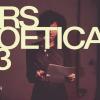6: Poem reading, Adi Keissar's "A Poem For Those," 2014.
Adi Keissar is the original artist behind Ars Poetika, a grassroots movement of new Israeli poets, and especially, Mizrahi poets, which Keissar founded in 2013. It takes its name from the word "ars" (Arabic for "pimp," and an Israeli pejorative term for Mizrahi men) and Horace's ancient poem on "the art of poetry," "Ars Poetica." In a Forward article by fellow Yemeni-Israeli writer Ayelet Tsabari, Keissar says that “In Israel, like in the world, there’s one narrative that erases and defines other narratives.” But, in reference to her Ars Poetika poetry-reading/party series also providing a space for Ashkenazic writers, she insists, “The idea of Ars Poetica is that it doesn’t exclude.”
Israeli literary scholar Dror Mishani writes of an issue of the periodical Hakivun mizrakh (Eastward Bound) focusing on such art as Behar's and Keissar's, which seeks to reclaim an Arabic Jewish past by the creation of a Mizrahi idiom in Hebrew literature, "It reminds [Israeli] Hebrew of all the opportunities it missed, of all the possible Hebrews that it put to sleep inside itself, that it forgot, and that resurface now to speak."
In this work, "A Poem For Those" ("Shir le-mi"), Keissar responds to such tensions in Israeli society and high art, with an assertive message, and a prophecy, for those "who speak the right language / with the right accent."
(For another relevant poem by Keissar, which comments on the language rupture between a Yemeni-Jewish woman and her Israeli-born granddaughter, see this video of the poet reading her work "Shakhor ‘al gabei shakhor" ("Black on Black"), at an event sponsored by the University of Texas at Austin's Institute for Israel Studies in 2017. Her recitation is followed by a translation of the poem into English.)
Suggested activity: Watch the video with your students and get their immediate impressions. How did it affect them, and did they like it? Did it make them feel powerful, uncomfortable, confused, excited, or something else? Why? Then try to puzzle out Keissar's meaning. Who does the speaker of the poem seem to be addressing? Who "will ask / to rip the door from its place / and tear down the house"? What might "tearing down the house" mean? Is anyone in Behar's story trying to "tear down the house"? Is Behar himself, and Keissar also? In what ways?
Source: Ars Poetika (YouTube handle “ArsPoetika”), “Ars poetika 13 / Adi Keissar” (May 11, 2014, <https://www.youtube.com/watch?v=jRajmkL-cHU>, accessed April 12, 2018), Adi Keissar performing "Shir lemi" at a reading in Tel Aviv, January 26, 2014, web video.
Ars Poetica 13/ Adi Keissar
 Download video (0 bytes)
Download video (0 bytes)

